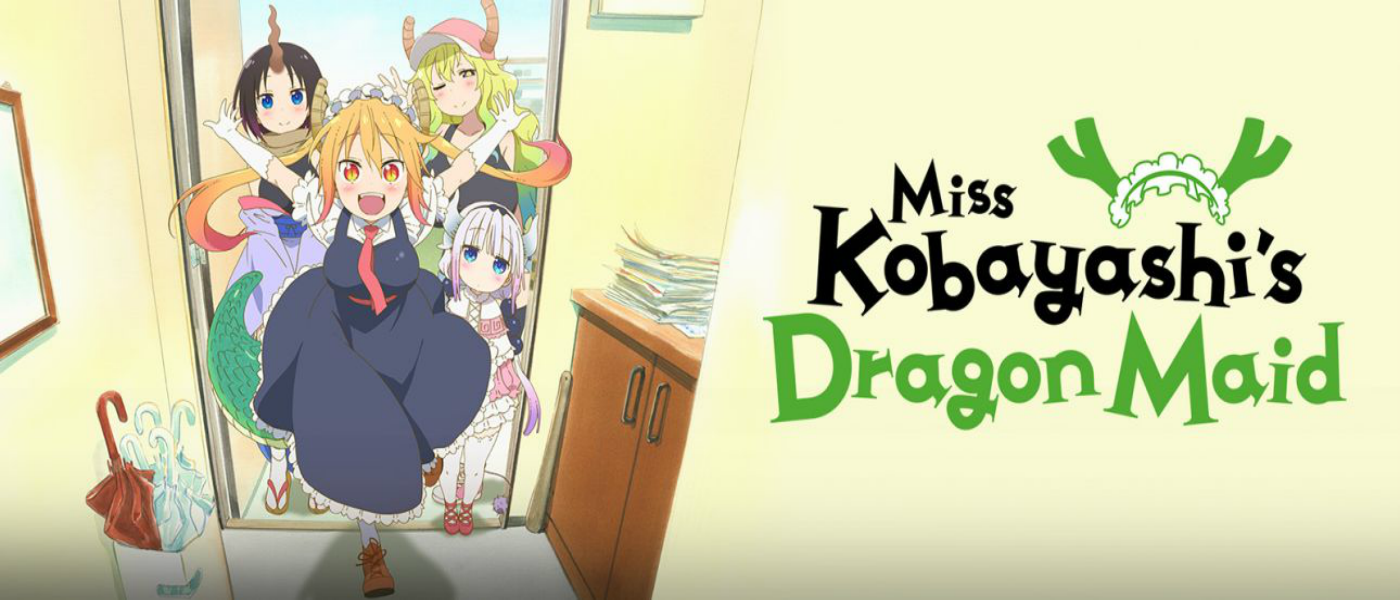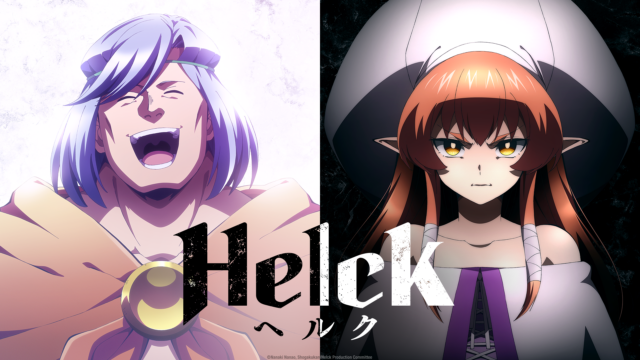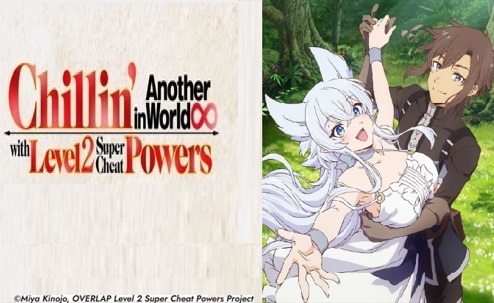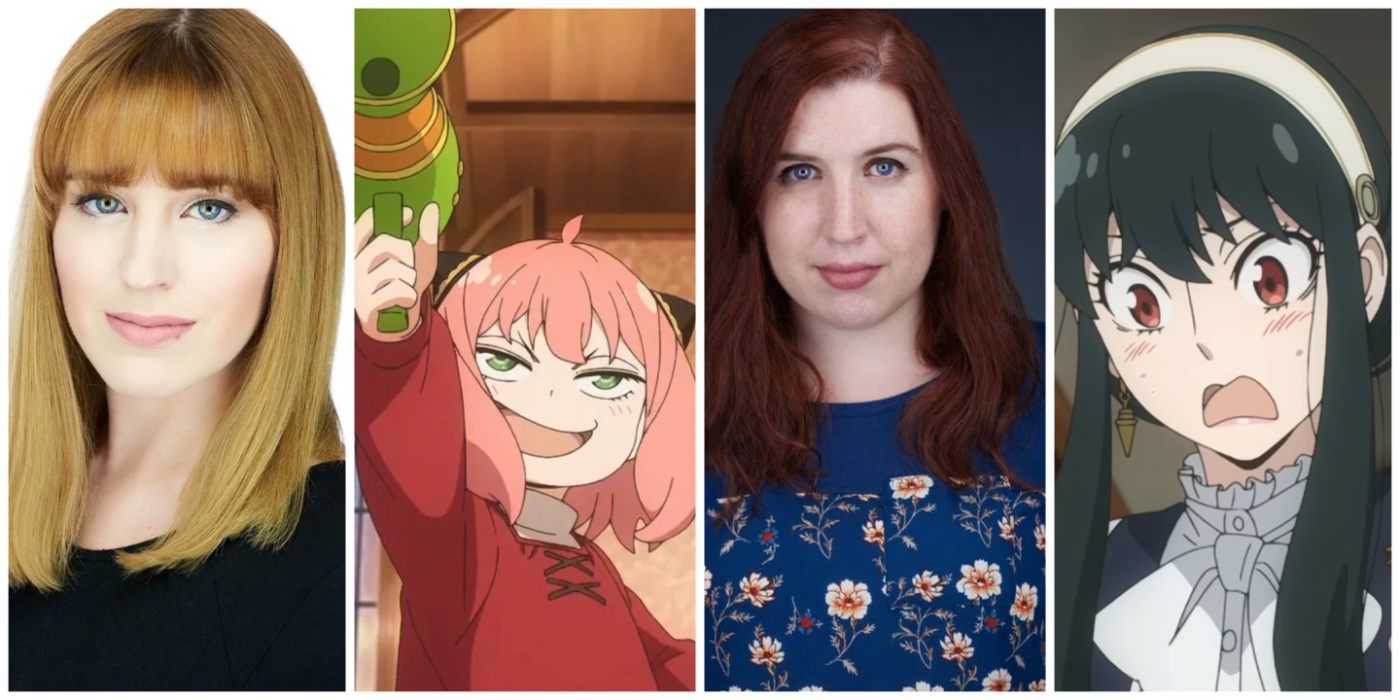English Dub Season Review: Miss Kobayashi’s Dragon Maid Season One
A Comedy Most Excellent!
Spoilers Below
Kobayashi is an exceptional programmer and the shining star of her office. She pretty much goes from home to work and back again, occasionally stopping to drown the sorrows of a bad boss by picking herself in strong alcohol. She has an obsession with maids and maid culture, one she shares with her cubicle-mate Takiya, an obsessive otaku if you ever saw one. Her life is one of lonely repetition, stress, and isolation. But, one night, after one of her benders, Kobayashi misses her train stop and jumps off in a deep forest.

There she runs into an enormous creature. A dragon stabbed with a holy sword and dying. Defying all logic and good sense, she pulls the sword out and sits to continue drinking with her new dragon friend. The creature takes on a human form and joins her, commiserating on their shared feelings of loneliness and lack of belonging. In her drunken stupor, Kobayashi makes an offer: Why doesn’t the dragon come to live with her as her maid? For reasons that only make sense to her, Tohru agrees. The next morning, she arrives and begins her duties. Though she has a bit of an adjustment period, having come from a completely different universe, she more than makes up for her lack of experience with a perky exuberance and a passionate attention to details. She isn’t alone in coming to the human world. Soon after, she is joined by her adorable little wyrmling friend Kanna, who moves in with the pair almost as if she were their daughter. This presses a need for space, and in the housewarming party for their new apartment, two more dragons come to pay respect: the ancient and malevolent Fafnir, and the voluptuous bounce-a-palooza Quetzalcoatl (just call her Lucoa). Also joining the crew is the way-too-young-to-have-those-kinds-of-thoughts human kids, Riko and Shota, classmates to Kanna. Lucoa moves in with Shota, and Fafnir finds a gaming buddy and roommate in Takiya. Our last addition is the hapless Elma, a dragon from the rival Harmony faction who is trapped in the human world after attempting to hunt Tohru. Everyone settles into an average human life and they grow together like a giant, extended family… With dragons.

I know, some of you are looking at that summary going “Snooze, bore-pocalypse inbound.” Some of you might look at the fact that three of these dragons sport gravity defying gazongas and say it’s just another fanservice anime. Buckle yourselves in, because you’re about to go on a trip where the fantastic world of high fantasy rams headlong into slice-of-life drama, leaving the rubble of slapstick and situational comedy strewn in every direction. The style of storytelling is almost like sketch comedy. You’ll get a scene or two of something that is important to the episode’s plot, followed by an almost unrelated scene showing one of the dragons trying to grasp some sort of human concept or deal with something completely ordinary to us. Then, back to the story. It cycles between the two, giving a sense of continuity and realness to their day.

The story takes place over a year, wherein we see two comic book conventions pass, one summer, one Christmas, and one New Years. The joy and fun these dragons take in our celebrations of humanity and community is heartwarming, and the mistakes they make along the way is quite hilarious. A major theme is the dragons dialing back on their mystical, destructive impulses to be as ordinary as possible. This requires a balance, and allowances have to be made so they can keep their sanity. The first of which is Kanna and Tohru’s excursions to the roof to turn into their dragon form and hose down like winged, beached whales.
The art and animation are top notch around these parts. It’s all traditional animation, all the way. These days, we could forgive a studio for animating a giant beast like these dragons in CG, but they made a conscious coince to continue drawing them. This keeps the art style flowing well from one scene to another, and allows the “chibi” versions of the characters to feel like their larger dragon counterparts. There are dragon vs. dragon fights (as well as a dragon vs. human dodgeball battle) that are just epic in scale and intensity. It’s like Dragonball Z with scales and horns in here, and breath weapons are flying as fast as the wings are. All while Kobayashi stares off in her deadpan expression. That’s the other thing this anime does well. While Torhu and Lucoa are bouncy and expressive, most of the other characters are subdued. Their reactions are subtle but betray a depth of emotion that begs questions. This show remembers that the little things in life are the most important in a community. It is in the small actions that we show our love, and our differences we find the connection.

This same attention to detail is shared by the voice acting cast for the English dub. Leah Clark and Sarah Wiedenheft were phenomenal in their portrayals of Kobayashi and Tohru. Sarah’s exuberant voice warmed the cockles of my heart, and Leah worked hard at giving us a range of emotion without breaking the deadpan introversion. This series also welcomes Rachel Glass to the list of headliners in voice-acting. Miss Glass has worked in the industry for a while, but most of the time it was extras and background characters. This is her first role portraying a character with a name, Elma, and she did a fine job. Elma was absolutely adorable, and Rachel brought out the many aspects of her personality. From an overbearing paladin to a hapless office good-for-nothing to a sweet-toothed desert addict, Elma’s nature shined through. I look forward to seeing Rachel Glass in more productions and will be looking for her name. You hear that, Funimation? I’m watching you! Oh, I guess that’s what you wanted. Carry on.
I know that there are more characters that appear in the manga than have shown up here, so there’s still some plot to explore with this series, but the season left off on a great note, and I feel like it resolved everything quite neatly. There could be a season two, but I doubt it. Going back through my reviews of the series, the average rating was an 8.4. However, I’d like to note the season (series?) finale was the first anime episode I remember giving a perfect score to. That, and the consistency with which it scored an eight or better should has lead me to round the score up a bit. I wholeheartedly recommend this anime to anyone who watches anime.
























Hi Ashley, thank you so much for reading and we love the feedback. Note that on that day we had 14th posts go up and only ten posts show on the front page, so it's possible the preview had already been archived by the time you got to it. One recommendation would be to add our RSS feed to your favorite news aggregator service like Feedly, this way you get all of the latest posts!